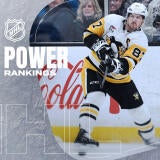NHL made the right call embracing chaos with EBUG status quo decision
Heading into this week's GM meetings in Florida, there was plenty of chatter about the league making changes to emergency backup procedures
Welcome to Please Like My Sport, the weekly column in which we find things that can (and should) make you excited about hockey this week. Whether you're already a hockey enjoyer or someone who is looking for reasons to become one, the goal is to deliver reasons for you to appreciate the NHL right now.
The NHL's emergency backup goalie system is seemingly here to stay, and that should come as good news to most hockey fans -- especially the ones that particularly enjoy a bit of chaos now and again. And let's be honest, if you enjoy the extremely weird and unpredictable sport of hockey, there's a good chance you embrace chaos.
But Monday's news that the league was going to leave the EBUG system in place probably came as a surprise to a good number of people. Heading into this week's GM meetings in Florida, there was plenty of chatter about the possibility of the league making changes to the way they approach the emergency backup goalie procedures.
This emergence of the discussion came in the wake of David Ayres, a Toronto-based Zamboni driver who was thrust into action as emergency backup goaltender for the Carolina Hurricanes in Toronto. After Carolina's two active, rostered goalies were injured in a game against the Maple Leafs on Feb. 22, the 42-year-old Ayres suited up for the Hurricanes and allowed two goals on his first two shots faced, then stopped the next eight to help Carolina pull off a stunning win against the Leafs. It was the first time in league history an EBUG recorded a win.
A 42-year-old Zamboni driver stepping up to become the unlikeliest of heroes and making a little bit of history in the process? It's an incredible story, one that catapulted Ayres and the NHL into the national spotlight. The league doesn't usually see that kind of popularity in the middle of February. Ayres was a hit.
Ayres fills in for Colbert pic.twitter.com/cOP3pHdQDY
— Andy Biscuits (@HeyHeyWadayaSay) February 25, 2020
Still, some people believed that the situation exposed a flaw in the system. Or, more precisely, the system itself as a whole is flawed. Why are we allowing an Average Joe to be inserted into a game on that stage, especially with an important two points in the standings on the line? It wasn't just sour grapes from Toronto fans either. The argument entered the media discourse as well, with prominent talking heads like former NHLer Kris Versteeg pushing to eliminate the EBUG system as we know it.
"This cannot happen," Verteeg said a few days after Ayres' big night. "The NHL is a multi-billion dollar business. If the Dallas Cowboys had three quarterbacks get hurt, they don't go downtown Dallas and see if any accountants can throw a pigskin around. This can't happen moving forward... it shouldn't happen again."
“If the Dallas Cowboys had three quarterbacks get hurt, they don't go downtown Dallas and see if any accountants can throw the pigskin around.”
— Sportsnet (@Sportsnet) February 24, 2020
While the David Ayres storyline was fun to watch, Kris Versteeg shares his thoughts on why it shouldn't happen again. #SNTrade pic.twitter.com/OXmu89YbHK
Ultimately, though, the league's general managers elected to keep things status quo.
At the NHL GM meetings in Boca Raton, the general managers discussed emergency backup goalie procedures, but doesn’t sound like there’s much appetite for reform. Sentiment is: it’s rare occurrence, and reacting now would be purely reactionary. Most like the system in place.
— Emily Kaplan (@emilymkaplan) March 2, 2020
"At the end of the discussion, the majority was happy with where we are at on it," NHL director of hockey operations Colin Campbell said, via ESPN. "It's a good human-interest story. I think the process works... our general managers are fine with where it's at right now."
It's too much fun to get rid of, according to NHL senior VP of communications Gary Meagher.
"I think everyone realizes that it's a great story for the league," Meagher said. "I know there was some coverage that we were going to take the fun out of the game, and there was never any discussion of that. I think everyone realized the coverage and how awesome it was."
It's a breath of fresh air to see the NHL recognizing a good thing and not overreacting to make unnecessary changes. It feels as though the league has been trying to chip away at chaos, for better or for worse, over the past handful of years.
Some of the chaos has been stripped in order to make the league a safer place for players, most notably:
- The league cracking down on big hits
- The helmet rule that forces players off the ice immediately after they lose their bucket
But chaos shouldn't be a casualty of the league's overcautios efforts to turn things into a perfect science, especially when they hurt the league's overall product and entertainment factor. (See: Frame-by-frame analysis of offside reviews and goaltender interference plays.)
Making sweeping changes to the EBUG system would have fallen into the latter classification -- a textbook attempt at trying too hard to fix what really isn't broken. In fact, the system seems to be working quite well. Since the EBUG protocol as we know it was implemented in 2015, there have only been two instances in which we've seen an emergency backup actually play in a game, and both led to outstanding, memorable human interest stories.
Aside from Ayres, the other instance came in 2018 when accountant Scott Foster played in a game for the Blackhawks, stopping all seven shots he faced in about 14 minutes of action to help preserve a 6-2 Chicago win. Foster also briefly became something of a notable icon around the sport, even presenting the Vezina Trophy at the 2018 NHL Award Ceremony.
It's hard to look at the EBUG system and say it presents a real issue when it has worked quite well the two times it's been utilized and both instances led to a very marketable story for the league. Is there room for things to go wrong and for the system to look a little more flawed in the future, especially if it ends up costing a team a valuable two points in the standings? Sure, but the current protocol has already shown it can work, too. The chaotic nature of the uncertainty is a large part of what makes the EBUG system so intriguing -- and also what makes the two success stories we've seen so amazing.
The NHL may be a multi-billion dollar business, but it's one that's built on organized chaos and entertainment value. Hockey is an inherently weird sport that should embrace its weirdness, and even cater to it at times. Amusement parks are profitable, too.


















